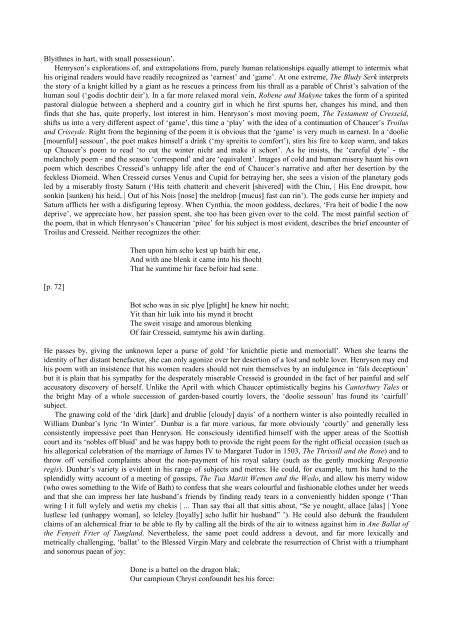THE SHORT OXFORD HISTORY OF ENGLISH LITERATURE
THE SHORT OXFORD HISTORY OF ENGLISH LITERATURE
THE SHORT OXFORD HISTORY OF ENGLISH LITERATURE
Create successful ePaper yourself
Turn your PDF publications into a flip-book with our unique Google optimized e-Paper software.
Blyithnes in hart, with small possessioun’.<br />
Henryson’s explorations of, and extrapolations from, purely human relationships equally attempt to intermix what<br />
his original readers would have readily recognized as ‘earnest’ and ‘game’. At one extreme, The Bludy Serk interprets<br />
the story of a knight killed by a giant as he rescues a princess from his thrall as a parable of Christ’s salvation of the<br />
human soul (‘godis dochtir deir’). In a far more relaxed moral vein, Robene and Makyne takes the form of a spirited<br />
pastoral dialogue between a shepherd and a country girl in which he first spurns her, changes his mind, and then<br />
finds that she has, quite properly, lost interest in him. Henryson’s most moving poem, The Testament of Cresseid,<br />
shifts us into a very different aspect of ‘game’, this time a ‘play’ with the idea of a continuation of Chaucer’s Troilus<br />
and Criseyde. Right from the beginning of the poem it is obvious that the ‘game’ is very much in earnest. In a ‘doolie<br />
[mournful] sessoun’, the poet makes himself a drink (‘my spreitis to comfort’), stirs his fire to keep warm, and takes<br />
up Chaucer’s poem to read ‘to cut the winter nicht and make it schort’. As he insists, the ‘careful dyte’ - the<br />
melancholy poem - and the season ‘correspond’ and are ‘equivalent’. Images of cold and human misery haunt his own<br />
poem which describes Cresseid’s unhappy life after the end of Chaucer’s narrative and after her desertion by the<br />
feckless Diomeid. When Cresseid curses Venus and Cupid for betraying her, she sees a vision of the planetary gods<br />
led by a miserably frosty Saturn (‘His teith chatterit and cheverit [shivered] with the Chin, | His Ene drowpit, how<br />
sonkin [sunken) his heid, | Out of his Nois [nose] the meldrop [mucus] fast can rin’). The gods curse her impiety and<br />
Saturn afflicts her with a disfiguring leprosy. When Cynthia, the moon goddess, declares, ‘Fra heit of bodie I the now<br />
deprive’, we appreciate how, her passion spent, she too has been given over to the cold. The most painful section of<br />
the poem, that in which Henryson’s Chaucerian ‘pitee’ for his subject is most evident, describes the brief encounter of<br />
Troilus and Cresseid. Neither recognizes the other:<br />
[p. 72]<br />
Then upon him scho kest up baith hir ene,<br />
And with ane blenk it came into his thocht<br />
That he sumtime hir face befoir had sene.<br />
Bot scho was in sic plye [plight] he knew hir nocht;<br />
Yit than hir luik into his mynd it brocht<br />
The sweit visage and amorous blenking<br />
Of fair Cresseid, sumtyme his awin darling.<br />
He passes by, giving the unknown leper a purse of gold ‘for knichtlie pietie and memoriall’. When she learns the<br />
identity of her distant benefactor, she can only agonize over her desertion of a lost and noble lover. Henryson may end<br />
his poem with an insistence that his women readers should not ruin themselves by an indulgence in ‘fals deceptioun’<br />
but it is plain that his sympathy for the desperately miserable Cresseid is grounded in the fact of her painful and self<br />
accusatory discovery of herself. Unlike the April with which Chaucer optimistically begins his Canterbury Tales or<br />
the bright May of a whole succession of garden-based courtly lovers, the ‘doolie sessoun’ has found its ‘cairfull’<br />
subject.<br />
The gnawing cold of the ‘dirk [dark] and drublie [cloudy] dayis’ of a northern winter is also pointedly recalled in<br />
William Dunbar’s lyric ‘In Winter’. Dunbar is a far more various, far more obviously ‘courtly’ and generally less<br />
consistently impressive poet than Henryson. He consciously identified himself with the upper areas of the Scottish<br />
court and its ‘nobles off bluid’ and he was happy both to provide the right poem for the right official occasion (such as<br />
his allegorical celebration of the marriage of James IV to Margaret Tudor in 1503, The Thrissill and the Rose) and to<br />
throw off versified complaints about the non-payment of his royal salary (such as the gently mocking Respontio<br />
regis). Dunbar’s variety is evident in his range of subjects and metres. He could, for example, turn his hand to the<br />
splendidly witty account of a meeting of gossips, The Tua Mariit Wemen and the Wedo, and allow his merry widow<br />
(who owes something to the Wife of Bath) to confess that she wears colourful and fashionable clothes under her weeds<br />
and that she can impress her late husband’s friends by finding ready tears in a conveniently hidden sponge (‘Than<br />
wring I it full wylely and wetis my chekis | ... Than say thai all that sittis about, “Se ye nought, allace [alas] | Yone<br />
lustlese led (unhappy woman], so leleley [loyally] scho luflit hir husband” ’). He could also debunk the fraudulent<br />
claims of an alchemical friar to be able to fly by calling all the birds of the air to witness against him in Ane Ballat of<br />
the Fenyeit Frier of Tungland. Nevertheless, the same poet could address a devout, and far more lexically and<br />
metrically challenging, ‘ballat’ to the Blessed Virgin Mary and celebrate the resurrection of Christ with a triumphant<br />
and sonorous paean of joy:<br />
Done is a battel on the dragon blak;<br />
Our campioun Chryst confoundit hes his force:









